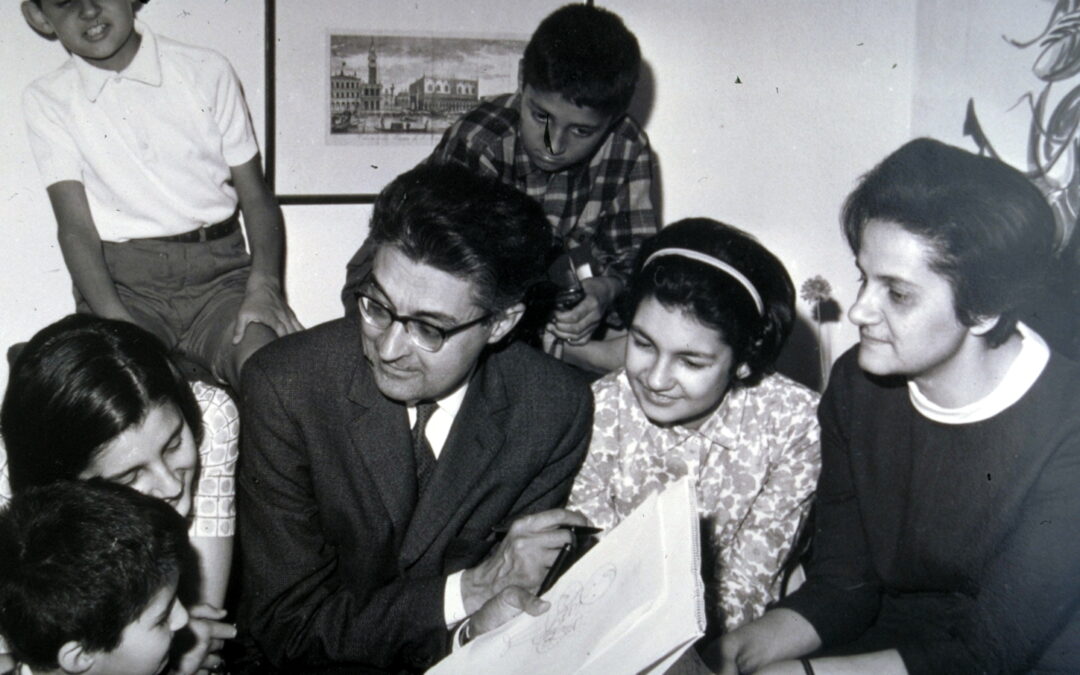
Feb 26, 2017 | Non categorizzato
 How important was it for you to meet Chiara Lubich, what impact did it have on you and your family, and what were the effects of your relationship with her and her spirituality? Danilo: “In the environment where Anna Maria and I were raised, traditional customs were of great importance. The family was present, but it was united more often due to social customs. Upon meeting Chiara we understood that being Christians entailed a choice, above all. That’s why we suffered a lot to free ourselves from the mentality of those times, and the attachment to our roles, circles, and professional titles. I had undertaken the career of an engineer, but to live the Gospel completely, we started to host the poor, and practice the communion of goods. All these things were a scandal, since they broke away from the customs of a bourgeois city. So my parents didn’t understand our decisions and were against them. I remember that once, I had gone to speak in a mountain town since I was also the diocesan president of the Catholic men. I was suffering and torn inside. Right after that I went to Church and found myself before a statue of Jesus Forsaken. I immediately and clearly understood that facing such painful moments is also part of our being Christians.”
How important was it for you to meet Chiara Lubich, what impact did it have on you and your family, and what were the effects of your relationship with her and her spirituality? Danilo: “In the environment where Anna Maria and I were raised, traditional customs were of great importance. The family was present, but it was united more often due to social customs. Upon meeting Chiara we understood that being Christians entailed a choice, above all. That’s why we suffered a lot to free ourselves from the mentality of those times, and the attachment to our roles, circles, and professional titles. I had undertaken the career of an engineer, but to live the Gospel completely, we started to host the poor, and practice the communion of goods. All these things were a scandal, since they broke away from the customs of a bourgeois city. So my parents didn’t understand our decisions and were against them. I remember that once, I had gone to speak in a mountain town since I was also the diocesan president of the Catholic men. I was suffering and torn inside. Right after that I went to Church and found myself before a statue of Jesus Forsaken. I immediately and clearly understood that facing such painful moments is also part of our being Christians.”
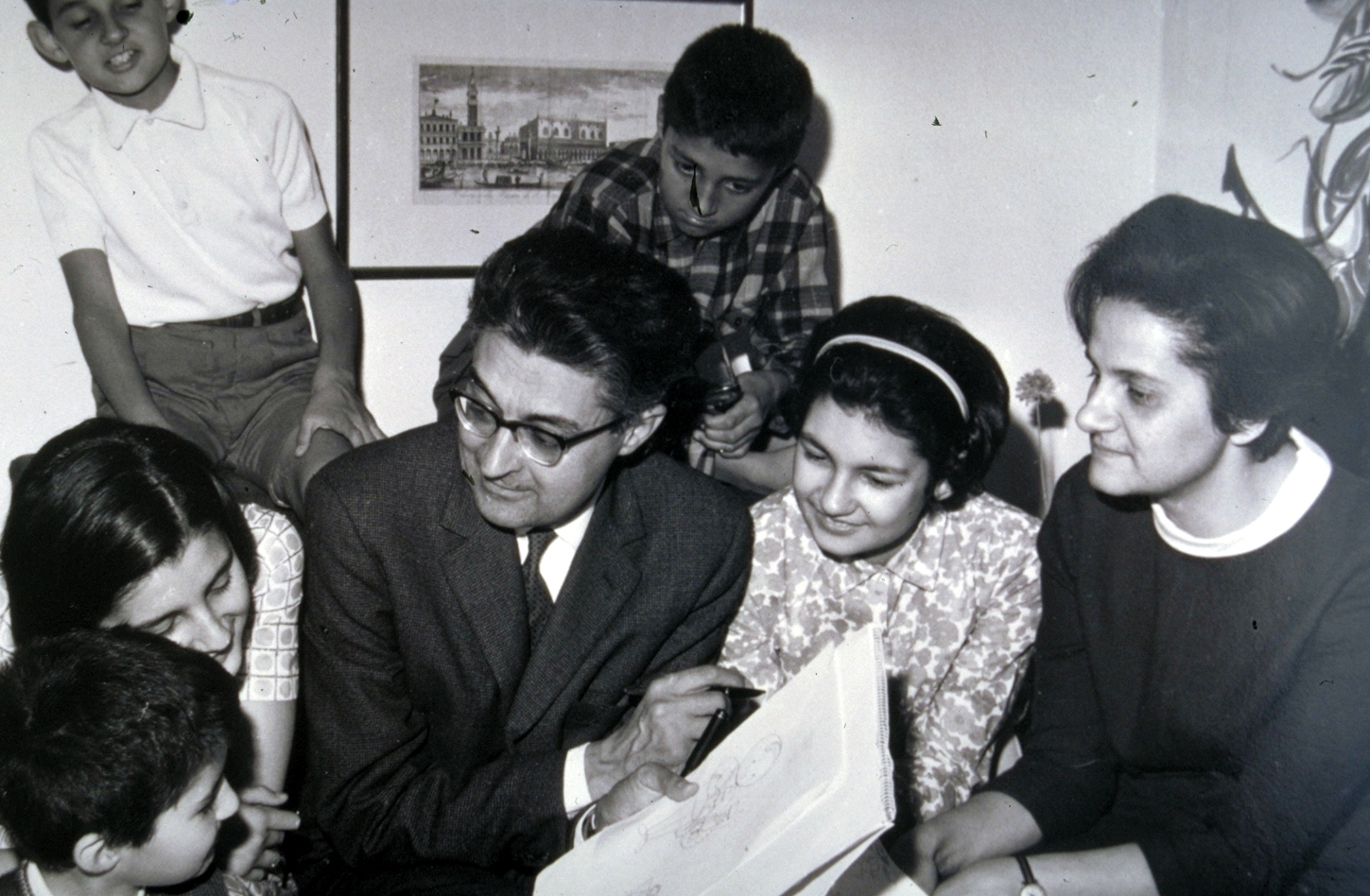
The Zanzucchi family
Giovanna Pieroni
![Interreligious friendships in England]()
Feb 25, 2017 | Non categorizzato
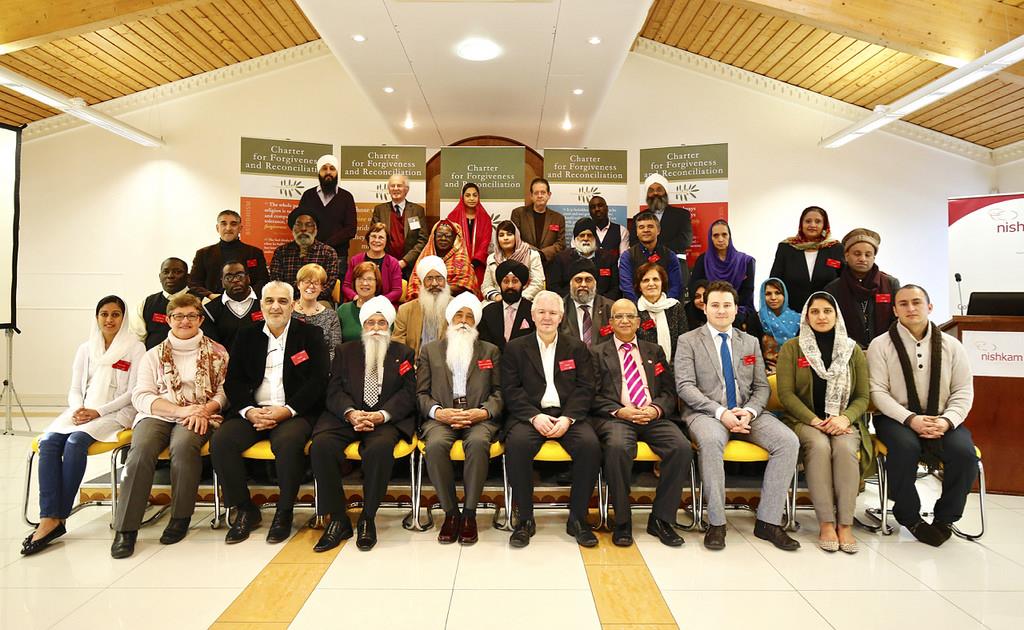 Birmingham is a multi-ethnic city of central England where the presence of different religions and cultures has become a breeding ground for dialogue. The city itself is a laboratory of interreligious relationships based on mutual respect and the discovery of each other’s values. Catholic Archbishop Bernard Longley, along with the council of religious leaders of other faiths in Birmingham, is directly involved in the interreligious field and more than once has expressed the desire that the Charism of Unity might bring a contribution in the Church and in ecumenical and interreligious dialogue. In October 2015, he made a house available to the Focolare in the diocese of Birmingham. Now, members from the community in Welwyn Garden City carry out many initiatives on a bi-monthly basis. They began with the Gen Verde international band’s “Start Now” project and continue carrying out many other initiatives.
Birmingham is a multi-ethnic city of central England where the presence of different religions and cultures has become a breeding ground for dialogue. The city itself is a laboratory of interreligious relationships based on mutual respect and the discovery of each other’s values. Catholic Archbishop Bernard Longley, along with the council of religious leaders of other faiths in Birmingham, is directly involved in the interreligious field and more than once has expressed the desire that the Charism of Unity might bring a contribution in the Church and in ecumenical and interreligious dialogue. In October 2015, he made a house available to the Focolare in the diocese of Birmingham. Now, members from the community in Welwyn Garden City carry out many initiatives on a bi-monthly basis. They began with the Gen Verde international band’s “Start Now” project and continue carrying out many other initiatives. 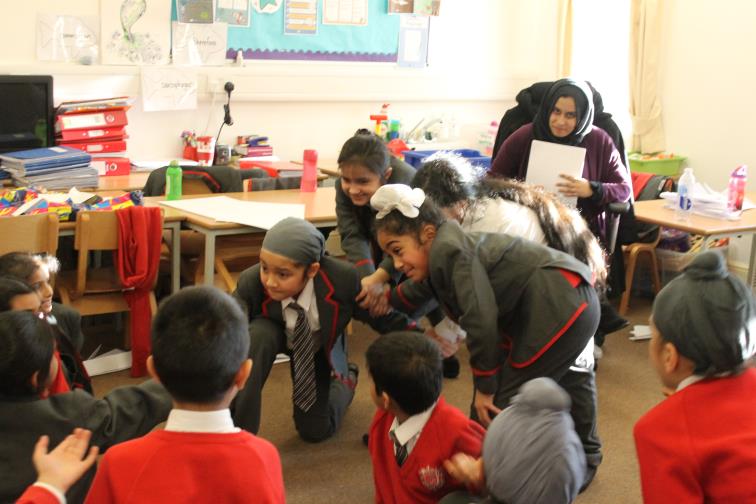 Last January, a Volunteer from the Focolare Movement, who is an expert in the field of education, ran the first of 4 workshops in a Sikh school for 70 children between the ages of 7 and 8. The theme was values. “The Sikhs feel a strong bond with us,” she recounts. “They say that like you, we try to model a society based on the fusion between the human and the divine. They find a harmony in the Movement that helps them to deepen their values and put them into practice.” The project is the culmination of a long friendship. For years the Sikh community guided by Bhi Sahib Bhai Mohinder Singh has been constantly linked to the Focolare community in Birmingham. The friendship and mutual esteem is deepening. “Bhai Sahib Ji often tells us that Chiara Lubich is his inspiration,” a Focolare member writes. “He keeps a photo of her on his desk.”
Last January, a Volunteer from the Focolare Movement, who is an expert in the field of education, ran the first of 4 workshops in a Sikh school for 70 children between the ages of 7 and 8. The theme was values. “The Sikhs feel a strong bond with us,” she recounts. “They say that like you, we try to model a society based on the fusion between the human and the divine. They find a harmony in the Movement that helps them to deepen their values and put them into practice.” The project is the culmination of a long friendship. For years the Sikh community guided by Bhi Sahib Bhai Mohinder Singh has been constantly linked to the Focolare community in Birmingham. The friendship and mutual esteem is deepening. “Bhai Sahib Ji often tells us that Chiara Lubich is his inspiration,” a Focolare member writes. “He keeps a photo of her on his desk.” 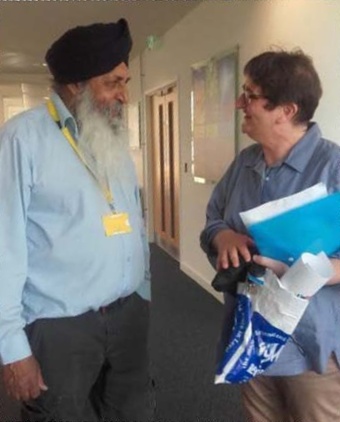 Sikhs and members of the Focolare recently took part together in an interreligious conference. Bhai Sahib Ji presented a project for promoting forgiveness and reconciliation. The event was an opportunity to strengthen friendships between members of different religions and beliefs, who now continue to stay in contact.
Sikhs and members of the Focolare recently took part together in an interreligious conference. Bhai Sahib Ji presented a project for promoting forgiveness and reconciliation. The event was an opportunity to strengthen friendships between members of different religions and beliefs, who now continue to stay in contact. 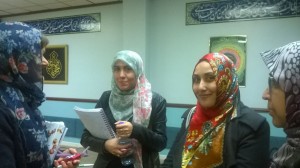 Still in January, Dr Mohammad Shomali, Founding Director of the International Institute for Islamic Studies in Qum, invited several men and women focolarini to speak to a group of thirty Muslims at a mosque in on one of the quarters of Birmingham. His desire was to “put together the people he esteems and loves the most: his community and the Focolare.” The Church’s dialogue with Islam was discussed, and the Spirituality of Unity was proposed, along with the presentation of a few experiences of living the Word. Many Muslims remained enthusiastic and want to stay in contact with the Focolare. “They invited us back on Sunday for the ‘Visit My Mosque’ event,” they report. They conclude: “Over the past weeks in which we have made many new friends of other faiths, we remembered a letter that Chiara wrote on November 23,1980 where she said: ‘…and if there is a mosque, or a synagogue, or some other non-Christian house of worship – know that that is where you belong…’ It’s a project about building the universal family, also among the faithful of other religions.”
Still in January, Dr Mohammad Shomali, Founding Director of the International Institute for Islamic Studies in Qum, invited several men and women focolarini to speak to a group of thirty Muslims at a mosque in on one of the quarters of Birmingham. His desire was to “put together the people he esteems and loves the most: his community and the Focolare.” The Church’s dialogue with Islam was discussed, and the Spirituality of Unity was proposed, along with the presentation of a few experiences of living the Word. Many Muslims remained enthusiastic and want to stay in contact with the Focolare. “They invited us back on Sunday for the ‘Visit My Mosque’ event,” they report. They conclude: “Over the past weeks in which we have made many new friends of other faiths, we remembered a letter that Chiara wrote on November 23,1980 where she said: ‘…and if there is a mosque, or a synagogue, or some other non-Christian house of worship – know that that is where you belong…’ It’s a project about building the universal family, also among the faithful of other religions.”
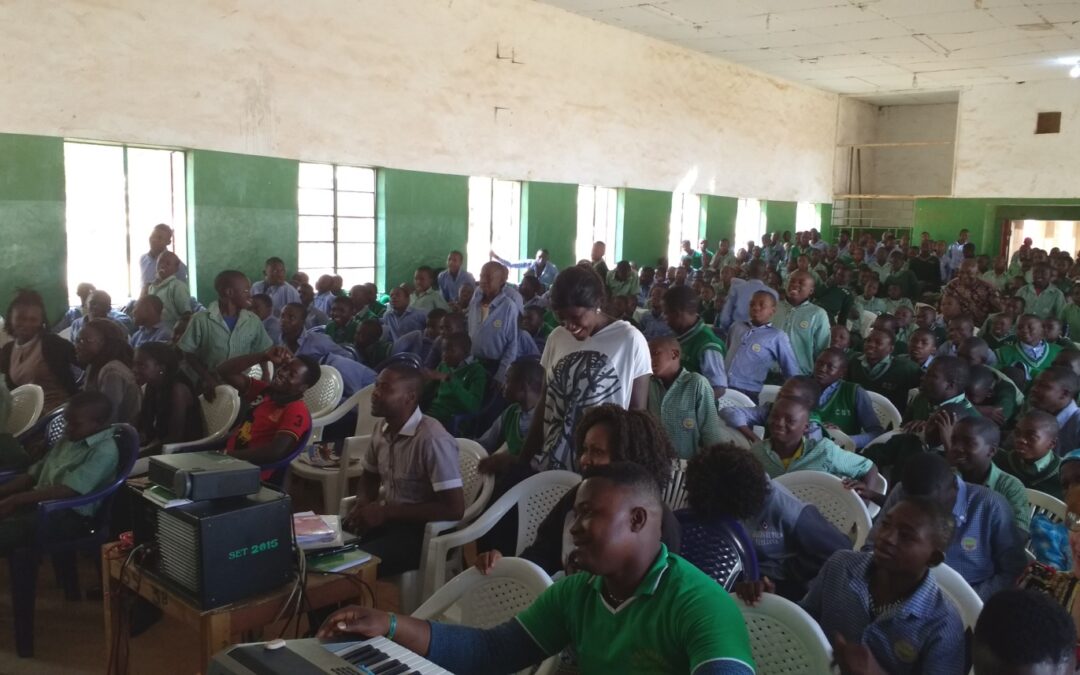
Feb 24, 2017 | Focolare Worldwide
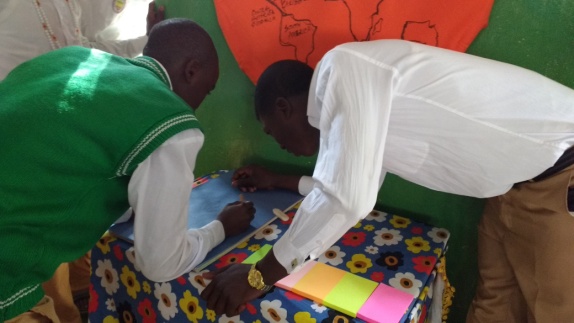 For three days, St Joseph’s College transformed into a fraternity experiment. The young students, ages 9 to 18, lived side by side with their professors, their families, as well as many other young people, adults and elderly from other cities. The Mariapolis was organised by members of the local Jos community, as well as other communities like that of Abuja (4 hours away) and Onitsa (12). There were also some young people of the Focolare from Lagos. In Nigeria, a country of seemingly limitless expanses, long trips bristling with danger often need to be overcome. Yet this did not stop anyone from supporting the Mariapolis at St. Joseph’s. The school opened its gates to welcome the young and not so young, students, teachers, workers. Among the Mariapolites was John Maigari, who had once attended and taught at the school. Now retired, Maigari also previously headed the diocese’s department of education. Many years prior he himself had experienced Mariapolis life, where each person sees each other as family to love and to serve. Now after many years, the professor hoped that the students could experience that same lifestyle. His proposal was welcomed.
For three days, St Joseph’s College transformed into a fraternity experiment. The young students, ages 9 to 18, lived side by side with their professors, their families, as well as many other young people, adults and elderly from other cities. The Mariapolis was organised by members of the local Jos community, as well as other communities like that of Abuja (4 hours away) and Onitsa (12). There were also some young people of the Focolare from Lagos. In Nigeria, a country of seemingly limitless expanses, long trips bristling with danger often need to be overcome. Yet this did not stop anyone from supporting the Mariapolis at St. Joseph’s. The school opened its gates to welcome the young and not so young, students, teachers, workers. Among the Mariapolites was John Maigari, who had once attended and taught at the school. Now retired, Maigari also previously headed the diocese’s department of education. Many years prior he himself had experienced Mariapolis life, where each person sees each other as family to love and to serve. Now after many years, the professor hoped that the students could experience that same lifestyle. His proposal was welcomed. 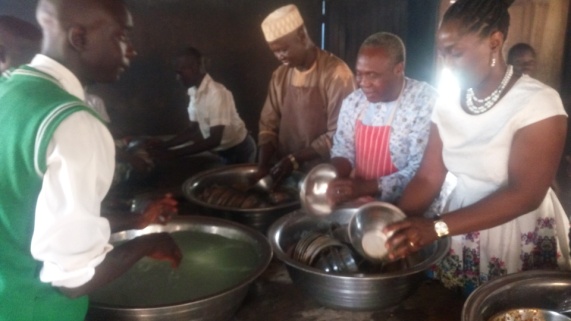 For three days, the school completely changed. Moments of reflection and going in depth were joined with tangible experiences. Divided into groups, students of different ages lived side by side with teachers and those attending, sharing the various moments of the day: cooking, washing dishes, tidying up the meeting hall, cleaning toilets and the school playground. For some it was their first time; they had never done anything like it. Even the school’s principal washed dishes! A large book was prepared for the students to capture their comments. It tells of three days of true living. The retreat changed their lives, they say. “The unity we lived during those days struck us from the very first moment that you set foot in our school.” It was a unity that the words of Chiara Lubich and the witness of the Focolare members had transmitted to them.
For three days, the school completely changed. Moments of reflection and going in depth were joined with tangible experiences. Divided into groups, students of different ages lived side by side with teachers and those attending, sharing the various moments of the day: cooking, washing dishes, tidying up the meeting hall, cleaning toilets and the school playground. For some it was their first time; they had never done anything like it. Even the school’s principal washed dishes! A large book was prepared for the students to capture their comments. It tells of three days of true living. The retreat changed their lives, they say. “The unity we lived during those days struck us from the very first moment that you set foot in our school.” It was a unity that the words of Chiara Lubich and the witness of the Focolare members had transmitted to them. 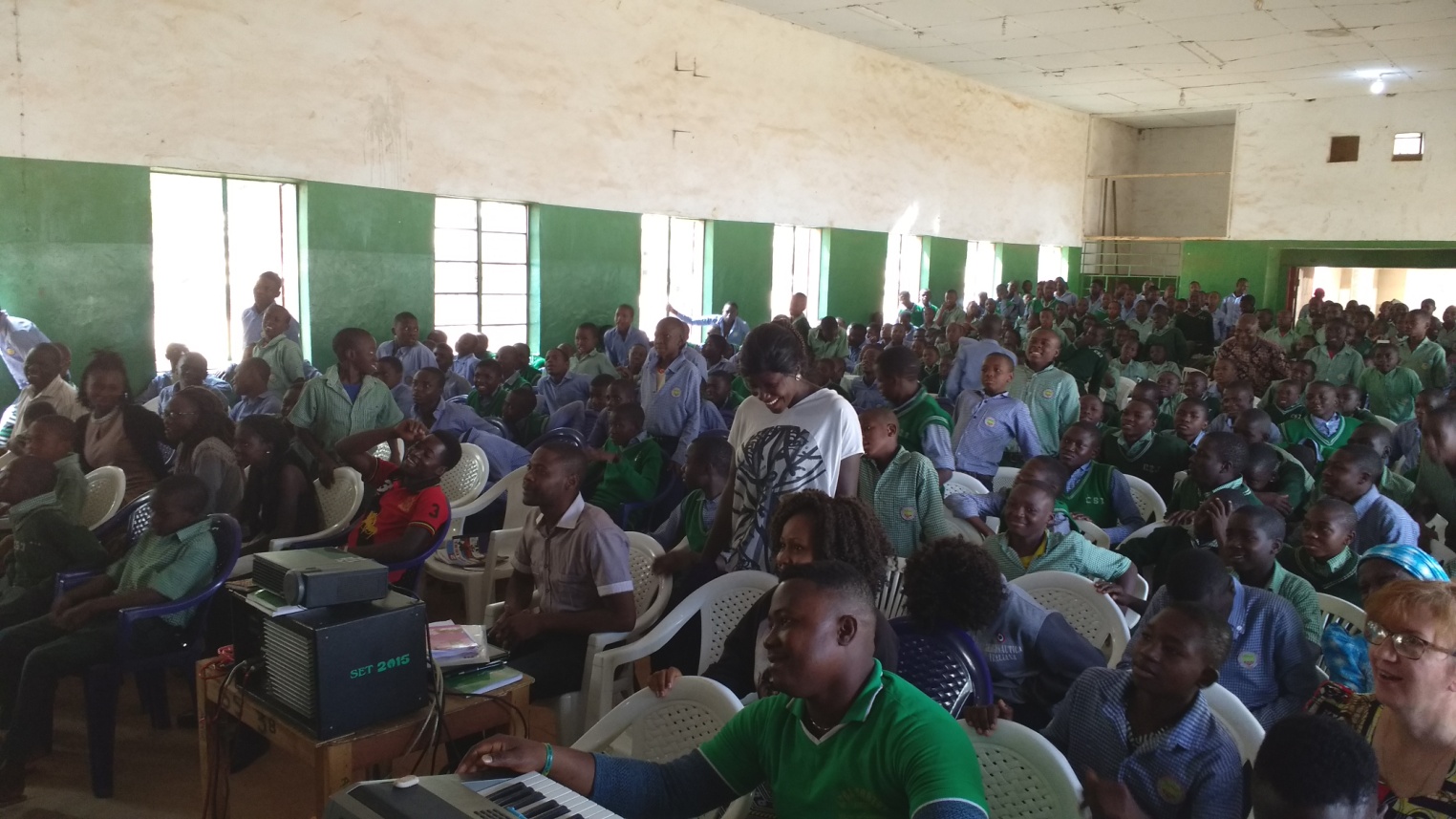 “I feel really happy and enthusiastic,” writes Nipps, “because these days were wonderful. I experienced many things and was particularly struck by the love and unity that the team of people who ran the program had between them.” “Before my life was incomplete,” says Keivin, “because I didn’t feel at all that God truly existed and was alive. Now I truly believe in God.” “This retreat wasn’t like the others,” adds Daong. “You ate with us and slept at our high school.” In this part of Nigeria, for years there have been many episodes of violence between Christians and Muslims, with seeds of hatred sown across the country. These young students also had lived through this. At the Mariapolis at Jos, they were able to experience an alternative: the firepower of God’s love and unity.
“I feel really happy and enthusiastic,” writes Nipps, “because these days were wonderful. I experienced many things and was particularly struck by the love and unity that the team of people who ran the program had between them.” “Before my life was incomplete,” says Keivin, “because I didn’t feel at all that God truly existed and was alive. Now I truly believe in God.” “This retreat wasn’t like the others,” adds Daong. “You ate with us and slept at our high school.” In this part of Nigeria, for years there have been many episodes of violence between Christians and Muslims, with seeds of hatred sown across the country. These young students also had lived through this. At the Mariapolis at Jos, they were able to experience an alternative: the firepower of God’s love and unity.
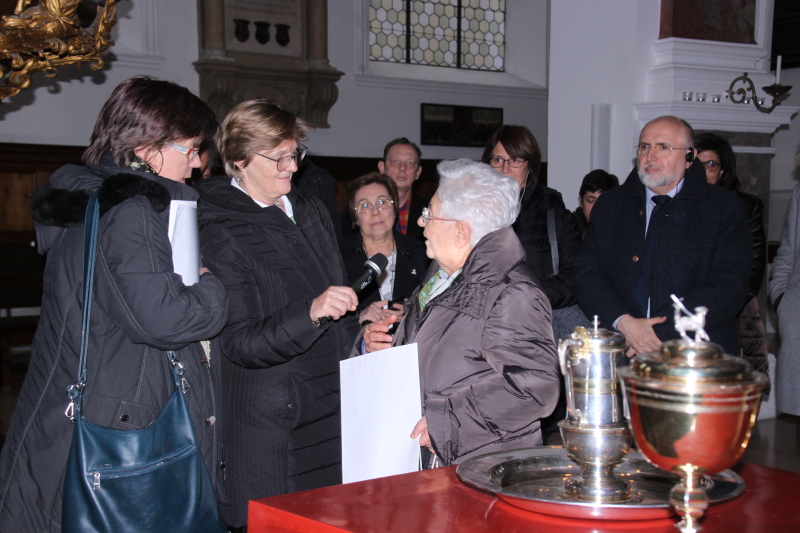
Feb 22, 2017 | Non categorizzato
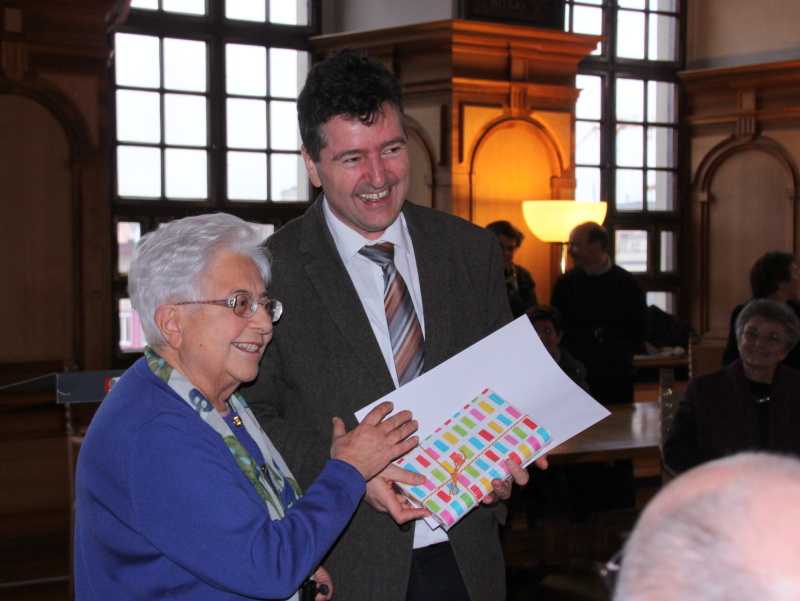
Maria Voce with the Vice-Mayor of Augsburg Dr Stefan Kiefer. Photo Maria Kny – © CSC Audiovisivi

Photo Maria Kny – © CSC Audiovisivi
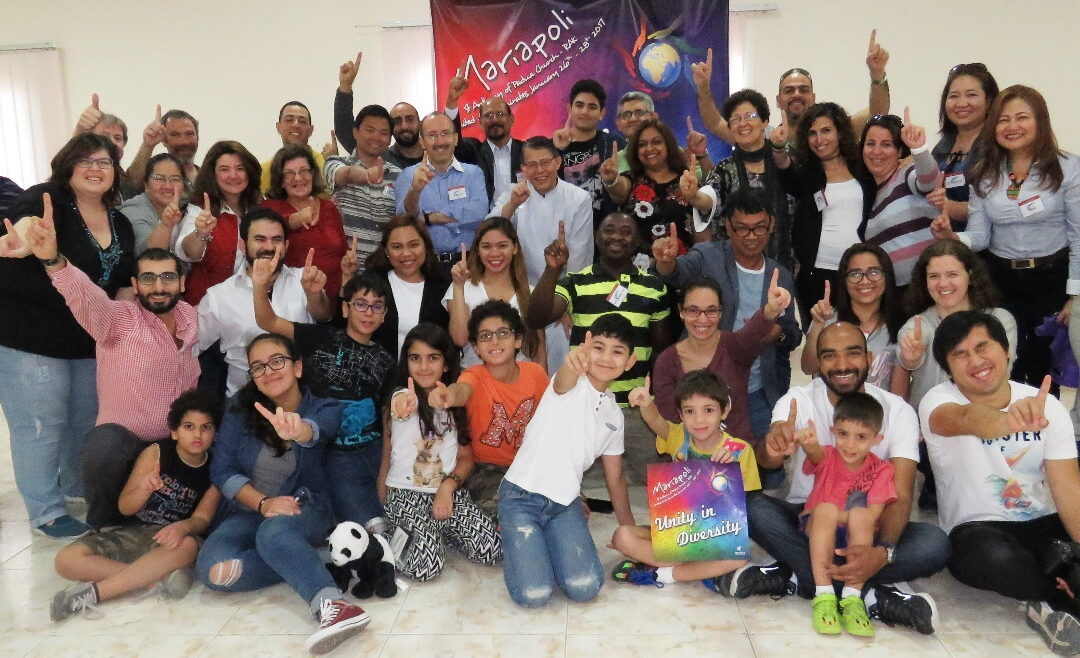
Feb 22, 2017 | Focolare Worldwide
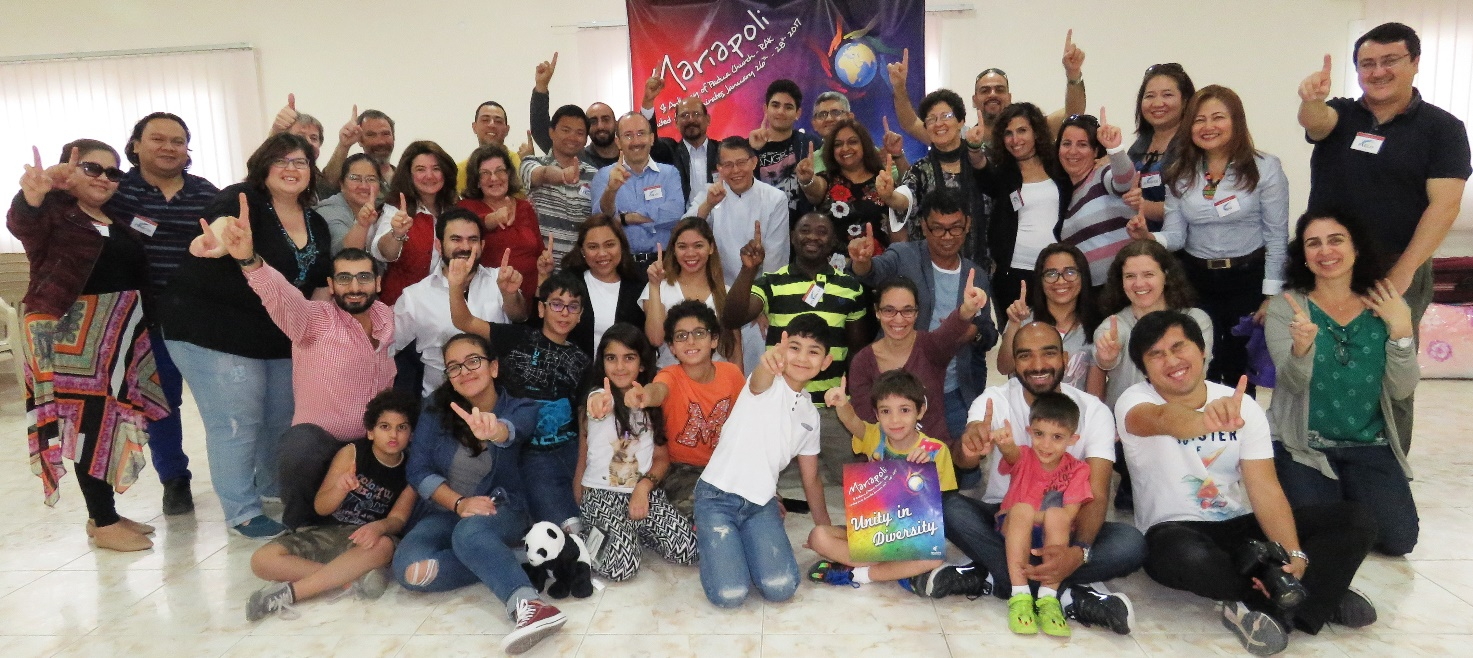 “We find ourselves here in countries of the United Arab Emirates due to work,” Claudia says. “Our workplaces are often strongly competitive, and it is difficult to integrate because there is little time for relationships that are simple and authentic. “The Catholic Church in Dubai is young, lively, joyous and not overly complicated. More than 2,000 faithful participate in and focus on daily mass – mostly from the Philippines, Pakistan and India. “Our local Focolare community is also made up mostly of migrants, and we try to give witness to the Gospel in the circles we move through, bringing love and unity around us. There are many who know about and live the spirituality of unity after first hearing about it in their home countries. We try to propose it to those whom we’re close to as a remedy to the frenetic, individualistic life here. “For us the monthly Word of Life meeting is fundamentally important. We read it together and try to go deeper into its meaning, sharing experiences that emerge from putting it into practice. “Maria Voce and Jesus Moran’s trip to India in January 2016 gave us a new drive to bring the ideal of unity to many, staying closely networked together.” “So we naturally involved all the people we’re in contact with to live the Mariapolis experience, which we took great care in preparing,” explains Amjad. “On January 27–28, 65 people from 12 countries (4 from the Middle East, the rest from Pakistan, the Philippines, Brazil, Japan, Italy and Cameroon) decided to come together at Ras Al Khaimah, an emirate near Dubai, to experience our first Mariapolis in these lands. “Emotions were running high! For some it seemed like a dream come true to finally get together after such a long time. We were welcomed by the parish of Father Willy, who is originally from the Philippines. The theme we chose, ‘Unity in diversity,’ reflected the reality and challenges that we all live through really well.” “What really struck me,” writes a young person from India,” was what we heard from Chiara Lubich about the ‘technique’ of building unity. Now I’d like to practice it.”“To discover how Jesus, in the moment he felt forsaken by the Father, can become a ‘key to unity’ in as much as I try to imitate him, filled me with hope,” said a woman from the Philippines. In a joyous atmosphere, participants were able to tell of their joys and difficulties, both in the hall and smaller groups, which is so important in order to share our lives together. There were moments to play, pray, and an intercultural evening to relax that included songs, video clips, skits and dances that involved everyone. “Special care was given to activities for the children, some of whom did not want to go back home,” says Claudia. “It was like an oasis,” explains Amjad, “where each of us found a family, with a spiritual presence of Jesus that is alive.” “During these past days, the fire of this ideal, which I got to know many years ago, was re-awakened,” confides a man from Brazil. “Now I want to give this fire to others.” Mia and Michel write: “It seemed to us that by the end, everyone returning to their countries or emirates, like Oman, Qatar, Bahrain, brought with them that ‘piece of fraternity’ that they had lived at the Mariapolis. Everyone evidently wanted to continue living this in their own environment, bringing hope to everyone. Now we keep connected through social media in a vibrant network, trying to help us live for each other, open to everyone.”
“We find ourselves here in countries of the United Arab Emirates due to work,” Claudia says. “Our workplaces are often strongly competitive, and it is difficult to integrate because there is little time for relationships that are simple and authentic. “The Catholic Church in Dubai is young, lively, joyous and not overly complicated. More than 2,000 faithful participate in and focus on daily mass – mostly from the Philippines, Pakistan and India. “Our local Focolare community is also made up mostly of migrants, and we try to give witness to the Gospel in the circles we move through, bringing love and unity around us. There are many who know about and live the spirituality of unity after first hearing about it in their home countries. We try to propose it to those whom we’re close to as a remedy to the frenetic, individualistic life here. “For us the monthly Word of Life meeting is fundamentally important. We read it together and try to go deeper into its meaning, sharing experiences that emerge from putting it into practice. “Maria Voce and Jesus Moran’s trip to India in January 2016 gave us a new drive to bring the ideal of unity to many, staying closely networked together.” “So we naturally involved all the people we’re in contact with to live the Mariapolis experience, which we took great care in preparing,” explains Amjad. “On January 27–28, 65 people from 12 countries (4 from the Middle East, the rest from Pakistan, the Philippines, Brazil, Japan, Italy and Cameroon) decided to come together at Ras Al Khaimah, an emirate near Dubai, to experience our first Mariapolis in these lands. “Emotions were running high! For some it seemed like a dream come true to finally get together after such a long time. We were welcomed by the parish of Father Willy, who is originally from the Philippines. The theme we chose, ‘Unity in diversity,’ reflected the reality and challenges that we all live through really well.” “What really struck me,” writes a young person from India,” was what we heard from Chiara Lubich about the ‘technique’ of building unity. Now I’d like to practice it.”“To discover how Jesus, in the moment he felt forsaken by the Father, can become a ‘key to unity’ in as much as I try to imitate him, filled me with hope,” said a woman from the Philippines. In a joyous atmosphere, participants were able to tell of their joys and difficulties, both in the hall and smaller groups, which is so important in order to share our lives together. There were moments to play, pray, and an intercultural evening to relax that included songs, video clips, skits and dances that involved everyone. “Special care was given to activities for the children, some of whom did not want to go back home,” says Claudia. “It was like an oasis,” explains Amjad, “where each of us found a family, with a spiritual presence of Jesus that is alive.” “During these past days, the fire of this ideal, which I got to know many years ago, was re-awakened,” confides a man from Brazil. “Now I want to give this fire to others.” Mia and Michel write: “It seemed to us that by the end, everyone returning to their countries or emirates, like Oman, Qatar, Bahrain, brought with them that ‘piece of fraternity’ that they had lived at the Mariapolis. Everyone evidently wanted to continue living this in their own environment, bringing hope to everyone. Now we keep connected through social media in a vibrant network, trying to help us live for each other, open to everyone.”
Feb 21, 2017 | Non categorizzato
The convention is being promoted by Providence University in collaboration with Dharma Drum Arts, the Sophia University Institute of Italy, Fu Jen Catholic University of Taiwan and other academic institutions in Taiwan and abroad. Among the participants are, the Arts and Sciences Professor of Dharma Drum, and likewise professors of Sophia in Italy, professors and scholars of various universities of the USA, monks and scholars from Thailand, Japan, South Korea and other religious groups. Since 2004, the Foclare Movement has been holding Buddhist-Christian symposiums every two years in various cities. The Symposiums amongst Buddhists (Mahayana and Theravada) and Christians have always been important steps in strengthening mutual trust on the basis of respect for the others, and in preparing to work together on this meeting in Taiwan.
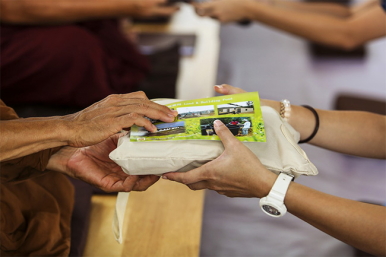
Feb 21, 2017 | Non categorizzato
 A concentration of Medieval towns and villages that are among the most beautiful in the country, ancient traditions, natural treasures, art and traces of an ancient culture that has sown Italy’s history with stories of a hard-working people that is tied to its roots. This is the central Italy that has been hit by an unfortunate series of earthquakes that continue to shake the region. The Italian Province of Fermo includes forty municipalities from the Sibillini Mountains to the sand and pebble beaches along the Adriatic Sea. On a clear night you can see the lights of neighbouring Croatia from the 13th century Dome Cathedral of Fermo. The Archdiocese also has ancient roots: Begun in the late 1500s, but going back to the 3rd century, it is the largest diocese in the region with120 parishes in 58 municipalities of the three Provinces of Ascoli Piceno, Fermo and Macerata. The Focolare’s Diocesan Movement began to take its first steps in the local Church of the region in 1973. As a branch of the Focolare Movement it works at the service of the local Church, offering and spreading the charism of unity in cooperation with other ecclesial groups, in order to make the Church a “Church-Communion”. In the whole territory around Fermo the earthquake caused devastation, evacuation and much fear. Two hundred churches were closed because they became inaccessible. Loredana, from the Diocesan Movement, tells about the experience of being close to the victims: “Along the coast, numerous camps and touristic villages are hosting 25 thousand people. In one camp site at Porto San Elpidio the Civil protection Agency set up an operation centre for this region. The local citizens has hosted more than a thousand people, entire families with children and grandparents, but several thousand moved away from here before being directed to other facilities along the coast. We took up a collection among us animators, to buy basic necessities. We set up a small coffee bar for the volunteers and evacuees. Once this phase was finished, the mayor and the councillor for culture met with representatives from schools to request support in organising workshops and recreational activities. Three of us were there representing the Diocesan Movement, but we had many others behind us that we knew were willing to help. Together with them we organised activities for the children and tutoring for the teenagers, locating teachers for every day and offering desserts prepared by our mothers and grandmothers. Strong friendships were established with teachers, children, teenagers and the elderly. Many evacuees are elderly. In Monte san Giusto, for example, around 120 evacuees were offered hospitality, including 42 from a rest home and 30 in wheelchairs. Two of us offered ourselves – one a social worker and the other a municipal guard – to listen to their needs. There were many personal initiatives. The young people from Porto San Elpidio, for example, made a lot of small Christmas trees that they then gave away to the families at the camp site. In the end, we collected 1,200 eruo for the RImPRESA Project in support of small inland production activities.”
A concentration of Medieval towns and villages that are among the most beautiful in the country, ancient traditions, natural treasures, art and traces of an ancient culture that has sown Italy’s history with stories of a hard-working people that is tied to its roots. This is the central Italy that has been hit by an unfortunate series of earthquakes that continue to shake the region. The Italian Province of Fermo includes forty municipalities from the Sibillini Mountains to the sand and pebble beaches along the Adriatic Sea. On a clear night you can see the lights of neighbouring Croatia from the 13th century Dome Cathedral of Fermo. The Archdiocese also has ancient roots: Begun in the late 1500s, but going back to the 3rd century, it is the largest diocese in the region with120 parishes in 58 municipalities of the three Provinces of Ascoli Piceno, Fermo and Macerata. The Focolare’s Diocesan Movement began to take its first steps in the local Church of the region in 1973. As a branch of the Focolare Movement it works at the service of the local Church, offering and spreading the charism of unity in cooperation with other ecclesial groups, in order to make the Church a “Church-Communion”. In the whole territory around Fermo the earthquake caused devastation, evacuation and much fear. Two hundred churches were closed because they became inaccessible. Loredana, from the Diocesan Movement, tells about the experience of being close to the victims: “Along the coast, numerous camps and touristic villages are hosting 25 thousand people. In one camp site at Porto San Elpidio the Civil protection Agency set up an operation centre for this region. The local citizens has hosted more than a thousand people, entire families with children and grandparents, but several thousand moved away from here before being directed to other facilities along the coast. We took up a collection among us animators, to buy basic necessities. We set up a small coffee bar for the volunteers and evacuees. Once this phase was finished, the mayor and the councillor for culture met with representatives from schools to request support in organising workshops and recreational activities. Three of us were there representing the Diocesan Movement, but we had many others behind us that we knew were willing to help. Together with them we organised activities for the children and tutoring for the teenagers, locating teachers for every day and offering desserts prepared by our mothers and grandmothers. Strong friendships were established with teachers, children, teenagers and the elderly. Many evacuees are elderly. In Monte san Giusto, for example, around 120 evacuees were offered hospitality, including 42 from a rest home and 30 in wheelchairs. Two of us offered ourselves – one a social worker and the other a municipal guard – to listen to their needs. There were many personal initiatives. The young people from Porto San Elpidio, for example, made a lot of small Christmas trees that they then gave away to the families at the camp site. In the end, we collected 1,200 eruo for the RImPRESA Project in support of small inland production activities.”
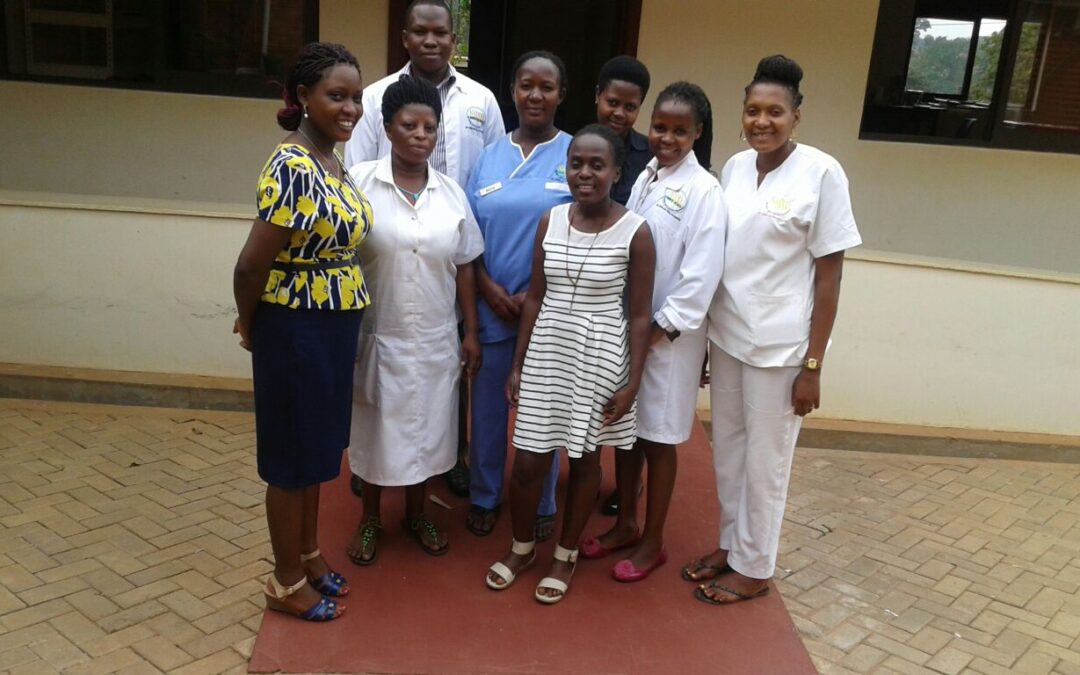
Feb 20, 2017 | Focolare Worldwide
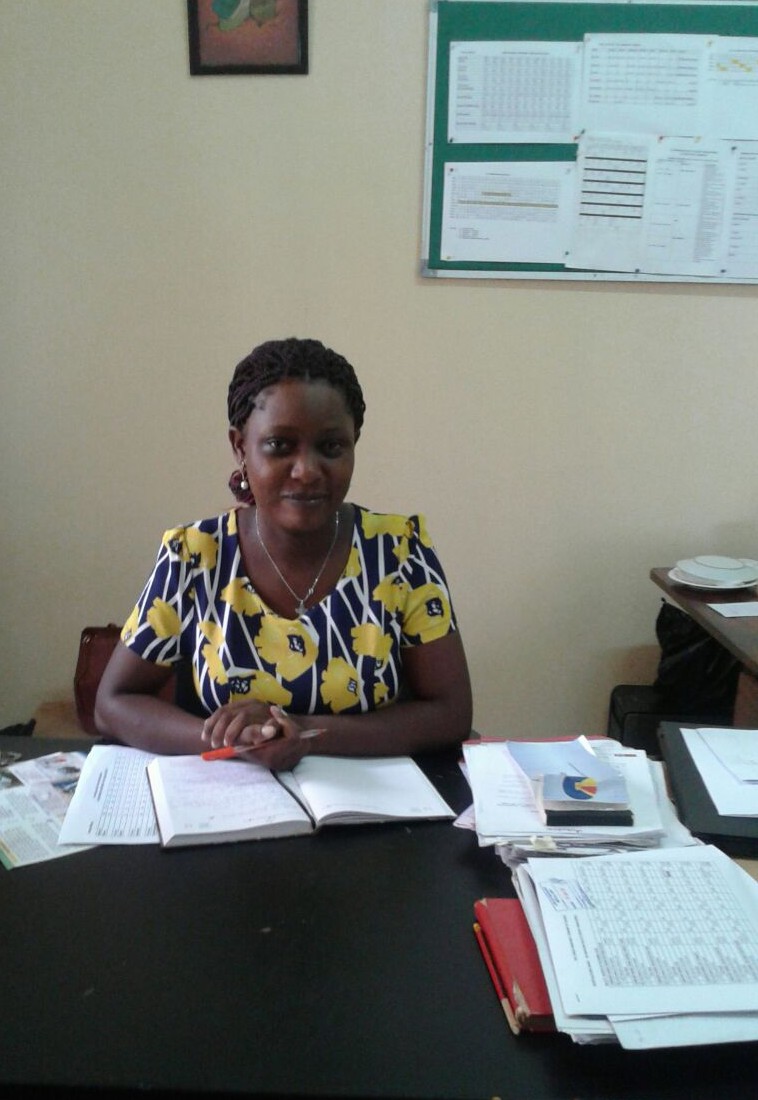 Ugandan business woman Rita Najjingo was among the 1,200 business owners and researchers of economy who were welcomed by Pope Francis on February 4, twenty five years from the start of the Economy of Communion Project (EoC). Seventy three percent of Rita’s country is made up of young people between the ages of 18 and 30, 47% of whom are unemployed. “Many of them try to set up small manufacturing activities,” Rita reports, “but because of a lack of capital and management skills, their businesses fail from start.” The idea of the EoC came to the African continent in recent years and immediately appeared as an answer. In 2015 several Ugandan entrepreneurs and researchers took part in a conference in Nairobi, Kenya, to learn about this economic project that puts the person first. When they went back to Uganda they talked with the local community and the first projects began in Ibanda, the western part of the country with a form of micro-credit that began to support a school for ex-cons; in Lira, the north, a home was built for elderly women, along with the cultivation of garlic, and so on. In Kampala,” Rita recounts, “there was the idea of involving the patients at a neary Focolare-run health centre which had a secure source of income. The idea was to be able to grant loans with their savings that they put in common, with loans for people who did not have enough capital to start up a manufacturing activity. An expert gave a week-long course and a savings and loan association was begun.
Ugandan business woman Rita Najjingo was among the 1,200 business owners and researchers of economy who were welcomed by Pope Francis on February 4, twenty five years from the start of the Economy of Communion Project (EoC). Seventy three percent of Rita’s country is made up of young people between the ages of 18 and 30, 47% of whom are unemployed. “Many of them try to set up small manufacturing activities,” Rita reports, “but because of a lack of capital and management skills, their businesses fail from start.” The idea of the EoC came to the African continent in recent years and immediately appeared as an answer. In 2015 several Ugandan entrepreneurs and researchers took part in a conference in Nairobi, Kenya, to learn about this economic project that puts the person first. When they went back to Uganda they talked with the local community and the first projects began in Ibanda, the western part of the country with a form of micro-credit that began to support a school for ex-cons; in Lira, the north, a home was built for elderly women, along with the cultivation of garlic, and so on. In Kampala,” Rita recounts, “there was the idea of involving the patients at a neary Focolare-run health centre which had a secure source of income. The idea was to be able to grant loans with their savings that they put in common, with loans for people who did not have enough capital to start up a manufacturing activity. An expert gave a week-long course and a savings and loan association was begun. 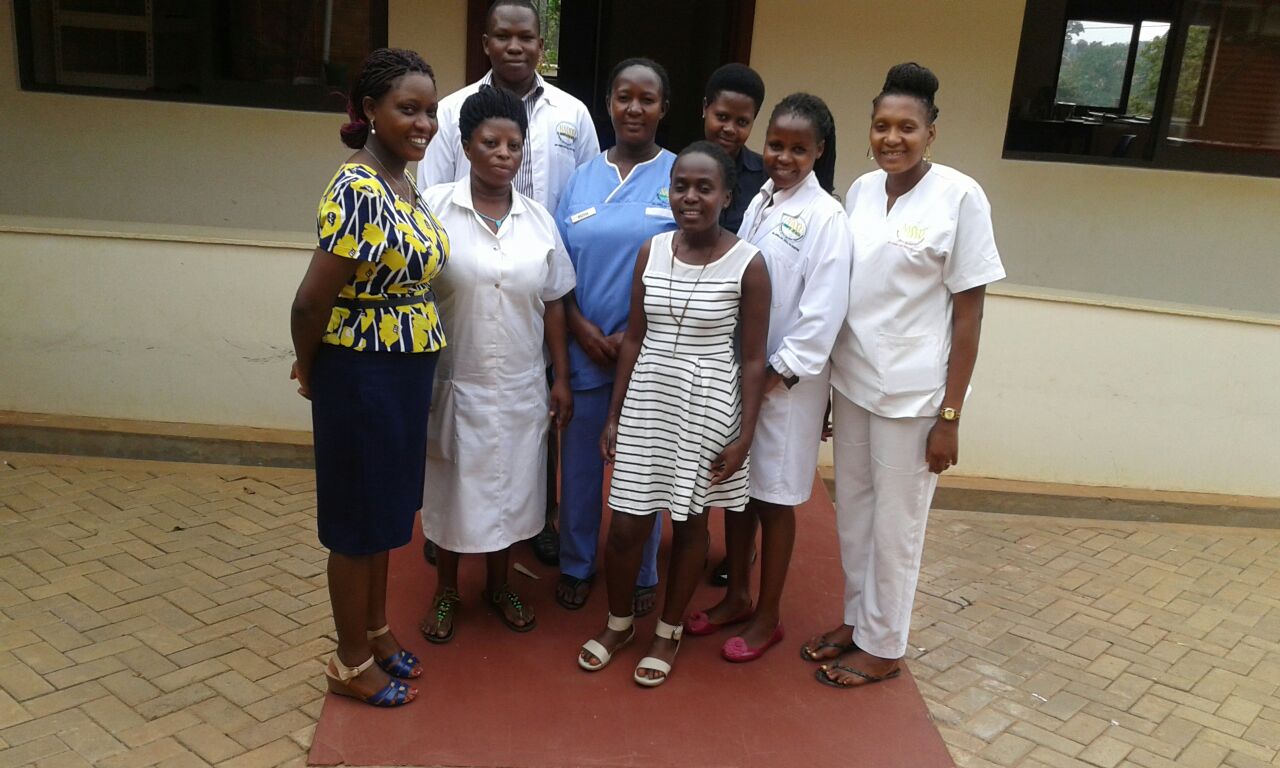 Typically the amount that is given in loan is never more than three times the capital the applican has on hand. The repayment starts after four weeks, leaving a small percentage for the increase of the share capital. Within three months, the debt is fully repaid. In granting a loan the promoter group enquires about the type of business that applicants intend to start, giving advice and accompanying them in their first steps. Over time, a group of experts in management has been formed that can also offer advice on managing, marketing and sustainability. One person asked for the loan to make handcrafted bags, another young person to buy a motorcycle he could rent out and also drive for pay, with a second loan and the sale of the old bike, he bought a more efficient one. He is now in charge of buying and selling used motorbikes, with help of two young men whom he hired. A member of the community has invested the loan in the purchase of sesame plants that are sold for various food uses. He too has been able to hire young people who help in delivery and removal of goods, thus facilitating things for manufacturers. With this loan activity, Rita continued, she was also able to create a fully registered company in charge of stationary and office supplies. After having used up the first loan, I got another to expand the business with online money transfers. Currently, I have four centres that have hired 4 young women, 3 of whom are single mothers.” A motorbike, small house, some garlic and sesame seeds . . . small signs, Pope Francis called them, in his speech to the EoC, seeds of change: “Change in the order of the spirit and therefore of life are not linked to big numbers. The little flock, the lamp, the coin, a ring, a pearl, some salt, leaven: these are the images of the Kingdom that we find in the Gospel. It doesn’t take many people to change our history, our life.” (Vatican City, February 4, 2017)
Typically the amount that is given in loan is never more than three times the capital the applican has on hand. The repayment starts after four weeks, leaving a small percentage for the increase of the share capital. Within three months, the debt is fully repaid. In granting a loan the promoter group enquires about the type of business that applicants intend to start, giving advice and accompanying them in their first steps. Over time, a group of experts in management has been formed that can also offer advice on managing, marketing and sustainability. One person asked for the loan to make handcrafted bags, another young person to buy a motorcycle he could rent out and also drive for pay, with a second loan and the sale of the old bike, he bought a more efficient one. He is now in charge of buying and selling used motorbikes, with help of two young men whom he hired. A member of the community has invested the loan in the purchase of sesame plants that are sold for various food uses. He too has been able to hire young people who help in delivery and removal of goods, thus facilitating things for manufacturers. With this loan activity, Rita continued, she was also able to create a fully registered company in charge of stationary and office supplies. After having used up the first loan, I got another to expand the business with online money transfers. Currently, I have four centres that have hired 4 young women, 3 of whom are single mothers.” A motorbike, small house, some garlic and sesame seeds . . . small signs, Pope Francis called them, in his speech to the EoC, seeds of change: “Change in the order of the spirit and therefore of life are not linked to big numbers. The little flock, the lamp, the coin, a ring, a pearl, some salt, leaven: these are the images of the Kingdom that we find in the Gospel. It doesn’t take many people to change our history, our life.” (Vatican City, February 4, 2017)
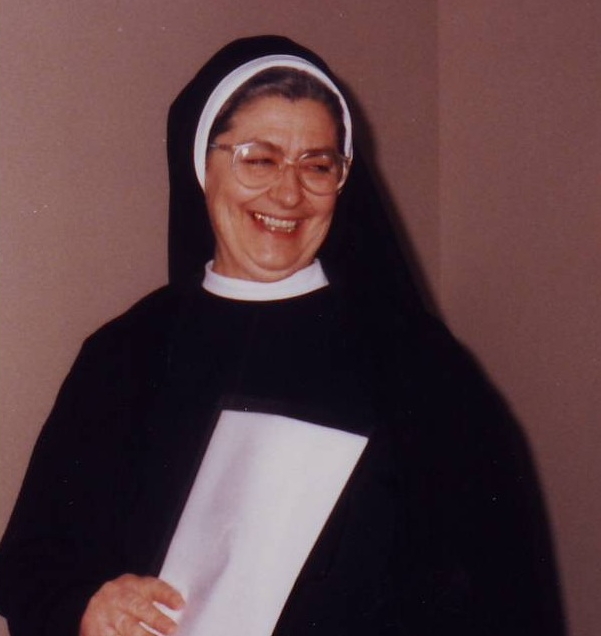
Feb 19, 2017 | Non categorizzato
 Born in a prestigious family in Rome, the institute chosen for her education was the Holy Spirit Institute run by the Daughters of the Immaculate Conception. In the institute she personally knew the foundress, now Blessed, and soon she felt the desire to give herself totally to God. Her family did not accept her choice, and after she escaped to go to the novitiate twice, she was forced to return home. Then due to her firm decision, she managed to convince her parents and make her dream come true. At the conclusion of her training in Northern Italy, she returned to Rome to teach in the school she had attended as a child and adolescent. Jovial and playful, Sr. Leopolda was able to conquer her students and with her smart remarks managed to downplay even the most complicated situations. In the 1970s she came across the spirituality of the Focolare and in it, discovered a sign of the times for the Church. Fascinated by the vision of Chiara Lubich who considered every charism a gift of love for the others, she felt the urge to create a current of communion among consecrated women of various religious families. Due to her moral and spiritual gifts, vast culture, and the great capacity to enhance the importance of people, in 1983 she was asked to guide the Congregation for 12 years. She personally met the founder of the Focolare, who in 1989 asked her to lead the Movement of the Religious at international levels, and promote communion among the Mother Generals who appreciated the spirituality of unity. Mother Leopolda accepted Chiara’s invitation with joy and responsibility, and wove a tight network of religious bound by the spirit of communion. She programmed and prepared annual meetings for consecrated women and mother generals. When her mandate to guide her congregation ended, she again took up her commitment in the educational field. The parents of her students considered her, “the most gentle and nicest Director of all the schools in the world.” When she fell ill, she was ready to say her “yes” to the God she had followed since her youth. She let Him guide her by the hand, offering all for the Church, her congregation, and the consecrated women she had met in life. In the more difficult moments she took comfort in the spiritual writings of Chiara, surrounded by her co-religious and the focolarine who were by her side up to the end. The doctors and staff of the hospital were struck by her testimony of serenity and total abandonment to God. Sr. Leopolda passed away on 1 January 2017, at the age of 87. The Focolare Movement remembers her with immense gratitude for her life spent entirely to diffuse among the religious, the spirit of communion that arises from the Charism of Unity.
Born in a prestigious family in Rome, the institute chosen for her education was the Holy Spirit Institute run by the Daughters of the Immaculate Conception. In the institute she personally knew the foundress, now Blessed, and soon she felt the desire to give herself totally to God. Her family did not accept her choice, and after she escaped to go to the novitiate twice, she was forced to return home. Then due to her firm decision, she managed to convince her parents and make her dream come true. At the conclusion of her training in Northern Italy, she returned to Rome to teach in the school she had attended as a child and adolescent. Jovial and playful, Sr. Leopolda was able to conquer her students and with her smart remarks managed to downplay even the most complicated situations. In the 1970s she came across the spirituality of the Focolare and in it, discovered a sign of the times for the Church. Fascinated by the vision of Chiara Lubich who considered every charism a gift of love for the others, she felt the urge to create a current of communion among consecrated women of various religious families. Due to her moral and spiritual gifts, vast culture, and the great capacity to enhance the importance of people, in 1983 she was asked to guide the Congregation for 12 years. She personally met the founder of the Focolare, who in 1989 asked her to lead the Movement of the Religious at international levels, and promote communion among the Mother Generals who appreciated the spirituality of unity. Mother Leopolda accepted Chiara’s invitation with joy and responsibility, and wove a tight network of religious bound by the spirit of communion. She programmed and prepared annual meetings for consecrated women and mother generals. When her mandate to guide her congregation ended, she again took up her commitment in the educational field. The parents of her students considered her, “the most gentle and nicest Director of all the schools in the world.” When she fell ill, she was ready to say her “yes” to the God she had followed since her youth. She let Him guide her by the hand, offering all for the Church, her congregation, and the consecrated women she had met in life. In the more difficult moments she took comfort in the spiritual writings of Chiara, surrounded by her co-religious and the focolarine who were by her side up to the end. The doctors and staff of the hospital were struck by her testimony of serenity and total abandonment to God. Sr. Leopolda passed away on 1 January 2017, at the age of 87. The Focolare Movement remembers her with immense gratitude for her life spent entirely to diffuse among the religious, the spirit of communion that arises from the Charism of Unity.
Feb 18, 2017 | Non categorizzato
https://vimeo.com/204141968

 How important was it for you to meet Chiara Lubich, what impact did it have on you and your family, and what were the effects of your relationship with her and her spirituality? Danilo: “In the environment where Anna Maria and I were raised, traditional customs were of great importance. The family was present, but it was united more often due to social customs. Upon meeting Chiara we understood that being Christians entailed a choice, above all. That’s why we suffered a lot to free ourselves from the mentality of those times, and the attachment to our roles, circles, and professional titles. I had undertaken the career of an engineer, but to live the Gospel completely, we started to host the poor, and practice the communion of goods. All these things were a scandal, since they broke away from the customs of a bourgeois city. So my parents didn’t understand our decisions and were against them. I remember that once, I had gone to speak in a mountain town since I was also the diocesan president of the Catholic men. I was suffering and torn inside. Right after that I went to Church and found myself before a statue of Jesus Forsaken. I immediately and clearly understood that facing such painful moments is also part of our being Christians.”
How important was it for you to meet Chiara Lubich, what impact did it have on you and your family, and what were the effects of your relationship with her and her spirituality? Danilo: “In the environment where Anna Maria and I were raised, traditional customs were of great importance. The family was present, but it was united more often due to social customs. Upon meeting Chiara we understood that being Christians entailed a choice, above all. That’s why we suffered a lot to free ourselves from the mentality of those times, and the attachment to our roles, circles, and professional titles. I had undertaken the career of an engineer, but to live the Gospel completely, we started to host the poor, and practice the communion of goods. All these things were a scandal, since they broke away from the customs of a bourgeois city. So my parents didn’t understand our decisions and were against them. I remember that once, I had gone to speak in a mountain town since I was also the diocesan president of the Catholic men. I was suffering and torn inside. Right after that I went to Church and found myself before a statue of Jesus Forsaken. I immediately and clearly understood that facing such painful moments is also part of our being Christians.” 


 Last January, a
Last January, a  Sikhs and members of the Focolare recently took part together in an interreligious conference. Bhai Sahib Ji presented a project for promoting forgiveness and reconciliation. The event was an opportunity to strengthen friendships between members of different religions and beliefs, who now continue to stay in contact.
Sikhs and members of the Focolare recently took part together in an interreligious conference. Bhai Sahib Ji presented a project for promoting forgiveness and reconciliation. The event was an opportunity to strengthen friendships between members of different religions and beliefs, who now continue to stay in contact. 


 For three days, the school completely changed. Moments of reflection and going in depth were joined with tangible experiences. Divided into groups, students of different ages lived side by side with teachers and those attending, sharing the various moments of the day: cooking, washing dishes, tidying up the meeting hall, cleaning toilets and the school playground. For some it was their first time; they had never done anything like it. Even the school’s principal washed dishes! A large book was prepared for the students to capture their comments. It tells of three days of true living. The retreat changed their lives, they say. “The unity we lived during those days struck us from the very first moment that you set foot in our school.” It was a unity that the words of
For three days, the school completely changed. Moments of reflection and going in depth were joined with tangible experiences. Divided into groups, students of different ages lived side by side with teachers and those attending, sharing the various moments of the day: cooking, washing dishes, tidying up the meeting hall, cleaning toilets and the school playground. For some it was their first time; they had never done anything like it. Even the school’s principal washed dishes! A large book was prepared for the students to capture their comments. It tells of three days of true living. The retreat changed their lives, they say. “The unity we lived during those days struck us from the very first moment that you set foot in our school.” It was a unity that the words of 



 “We find ourselves here in countries of the United Arab Emirates due to work,” Claudia says. “Our workplaces are often strongly competitive, and it is difficult to integrate because there is little time for relationships that are simple and authentic. “The Catholic Church in Dubai is young, lively, joyous and not overly complicated. More than 2,000 faithful participate in and focus on daily mass – mostly from the Philippines, Pakistan and India. “Our local Focolare community is also made up mostly of migrants, and we try to give witness to the Gospel in the circles we move through, bringing love and unity around us. There are many who know about and live the
“We find ourselves here in countries of the United Arab Emirates due to work,” Claudia says. “Our workplaces are often strongly competitive, and it is difficult to integrate because there is little time for relationships that are simple and authentic. “The Catholic Church in Dubai is young, lively, joyous and not overly complicated. More than 2,000 faithful participate in and focus on daily mass – mostly from the Philippines, Pakistan and India. “Our local Focolare community is also made up mostly of migrants, and we try to give witness to the Gospel in the circles we move through, bringing love and unity around us. There are many who know about and live the 

 Ugandan business woman Rita Najjingo was among the 1,200 business owners and researchers of economy who were welcomed by Pope Francis on February 4, twenty five years from the start of the
Ugandan business woman Rita Najjingo was among the 1,200 business owners and researchers of economy who were welcomed by Pope Francis on February 4, twenty five years from the start of the 
